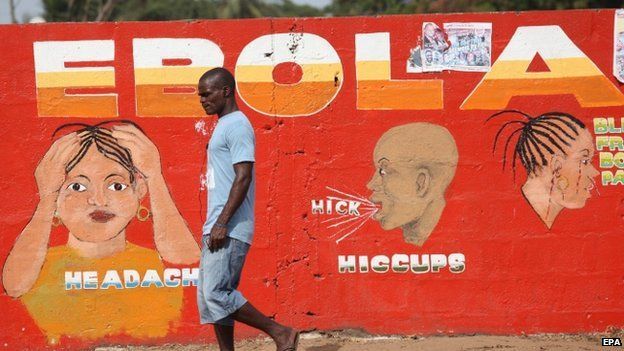Ebola crisis in Guinea 'has set back malaria fight'
By BBC News
The continuing Ebola epidemic in Guinea has set back the country's fight against malaria, say experts.
They estimate 74,000 cases of malaria went untreated in 2014 because clinics were either closed or patients were too scared to seek help.They warn that malaria deaths since the Ebola outbreak began will far exceed the number of Ebola deaths in the country - which now stand at 2,444.
Their report is in the Lancet Infectious Diseases journal.
Both Ebola and malaria cause fever. The authors of the Lancet report say fear surrounding the Ebola virus may have stopped patients in Guinea going to see a doctor to get this symptom checked.
'Extra burden'
Dr Mateusz Plucinski and colleagues analysed how many patients clinics in Guinea were seeing before and during the Ebola epidemic that emerged there in early 2014.They sampled 60 health facilities in the most Ebola-affected districts and 60 in districts unaffected by Ebola.
And they looked at malaria prescriptions dispensed before and during the epidemic.

At the same time, the rate of "just in case" or presumptive treatment of fever cases with antimalarial drugs in health facilities and by community health workers decreased or did not change.
The US experts warn that malaria deaths will have risen as a result. Meanwhile, Ebola seems to be abating.
According to the World Health Organization (WHO), in the most recent week for which there is data, there were 10 reported cases of Ebola in Guinea. In early 2015, cases were in the hundreds.
But malaria has been a long-standing problem in the region - particularly in the young. WHO estimates suggest it led to around 584,000 deaths globally in 2013. Most occurred among children in Africa.
Dr Franco Pagnoni, from the WHO's Global Malaria Programme, said untreated malaria cases had placed an additional burden on an already overburdened health system in the Ebola-affected countries.
He said it was important to ensure that Ebola containment and prevention activities were accompanied by efforts to detect, treat and prevent malaria in order to save more lives.
Towards the end of 2014, the World Health Organization recommended mass treatment of malaria irrespective of symptoms in areas heavily affected by Ebola. This happened in Liberia and Sierra Leone, but not Guinea.
Dr Plucinski said: "Malaria control efforts and care delivery must be kept on track during an Ebola epidemic so that progress made in malaria control is not jeopardised and Ebola outbreak response is not impeded."


0 Comments:
Post a Comment
Subscribe to Post Comments [Atom]
<< Home